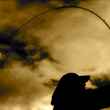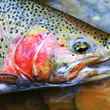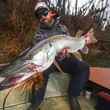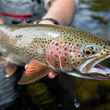After Team USA won its first international fly-fishing competition over the summer — a team win in the FIPS-Mouche Masters (over 50 division) World Fly Fishing Championship in Madonna de Compiglio, Italy — it was safe to wonder if competitive fly fishing could actually take off in the United States.
But, according to one prominent member of America’s international fly fishing team, it’s not a likely proposition.
“First, most Americans don’t know anything about it,” said Team USA board member Lance Egan, referencing the international fly-fishing competition. “They don’t know how it works, and there just isn’t an interest in making fly fishing a competitive sport in the United States.”
Egan, who returned to the U.S. in October after competing in the FIPS-Mouche World Championship in Spain — Team USA finished sixth — noted that efforts to have come and gone in the states, but there are significant elements missing if any such effort is to eventually succeed.
“Whenever we travel abroad to compete, one of the first things we notice about the other international teams is the corporate support they receive,” Egan said. When Team USA arrived in Spain compete in the world championships, the level of corporate support for other international teams was palpable, Egan said. That level of support just isn't present from the corporate sector in the U.S. That said, Egan gratefully noted that Team USA does receive some support from sponsors in order to travel and compete, even if the level of support is modest. And that's by design — the international competition isn't a gaudy affair. Think of it as the Olympics of fly fishing. Tasteful. Classy.
More Like This
Corporate sponsorship would seem to be an important missing element if fly fishing enthusiasts were to get behind a competitive fly fishing endeavor in America. Another missing link?
“By rule,” Egan said, “there’s no prize money in international fly fishing. It’s strictly forbidden.” Again, think of international competition where the competition is front-and-center, not the logo of the top corporate sponsor.
That, of course, doesn’t mean an independent effort to create a competitive fly fishing tour in the United States wouldn’t be able to gather up a host of sponsors, work with fishy destinations and then offer enough prize money to craft competitive events that might appeal to the best fly anglers in the country. But so far, that hasn’t happened, and Egan doesn’t expect that it ever will.
Unlike the wildly successful B.A.S.S. productions, which attract thousands of interested bass anglers and spectators to multiple Bassmaster events in multiple age classes, there is no recognized American equivalent in the fly fishing space. B.A.S.S. also has no shortage of corporate sponsors that want to attach their names to Bassmaster events. For example, in March 2023, B.A.S.S. will conduct the Academy Sports & Outdoors Bassmaster Classic presented by Huk. That’s preceded by the Bassmaster College Series that starts in January and is sponsored by Strike King and Bass Pro Shops. And, yes, there’s a high school Bassmaster event — it’s sponsored by Abu Garcia and Academy.
The big difference, of course, is participation. According to the American Sportfishing Association’s 2022 Special Report on Fishing, there were more than 40.5 million Americans who considered themselves freshwater anglers in 2021. That same report notes that there were just 7.5 million fly fishers that same year (and that’s down 300,000 from 2020 numbers, when the COVID pandemic resulted in a marked spike in fly fishing participation). While the study doesn’t differentiate between the types of species anglers are pursuing, it can be inferred that fishing for bass with spinning or baitcast gear is many times more popular than fly fishing for trout among the American public.
Another difference? The water. Bassmaster tournaments take place on large lakes and reservoirs, and participants motor all around these impoundments, decked out in sponsored gear, driving sponsored boats and using sponsored equipment. The impact on the fisheries? Perhaps it's significant in the short term, as bass are plucked from the water, stored in live wells and weighed and measured each day before being released. But consider what that might look like in the fly fishing world, where habitable trout water (assuming trout would be the targeted species) is a bit harder to come by.
An informal poll of fly fishers conducted on Facebook recently showed a lack of support for a competitive fly fishing tour modeled after a Bassmaster series in the United States. In fact, the opposition wasn’t only against the idea; it was steadfastly opposed, going so far as to comment on the social platform that competitive fly fishing would have such a negative impact on trout water that it would ruin fly fishing altogether. In all, a full 83 percent of those responding opposed the idea of a competitive fly fishing “tour” or event in the United States. Only 14 percent supported the notion, with 3 percent falling into the “maybe” category. One caveat: many who responded and commented said they might get behind a fly fishing competition that was conducted on private water, but not on publicly accessible water.
So, while many in the American fly fishing community are celebrating the nation’s first-ever international victory in the FIPS-Mouche arena, the majority of fly anglers don’t want anything to do with a competitive, highly marketed, heavily commercialized tour in this country. And to be clear, the international competition is nothing like a B.A.S.S. event. The fanfare is much more muted and the overall goal is different. Yes, anglers compete with one another, but there's also a unique team competition. It's about putting the nation's best anglers up against the best from other other countries, not about selfies with the Dallas Cowboy cheerleaders and giant trophies sporting corporate logos. And there are not huge pay days.
Corporate interests who serve the much smaller and much more subdued fly-fishing community have likely taken note of the anti-competition trend, particularly as it relates to the bass fishing tours. Until that trend changes (and let’s face it, that’s not likely), there won’t be corporate support for competitive fly fishing in the U.S.
“I think, in the U.S. market, potential corporate sponsors are dead scared of the idea of competitive fly fishing,” Egan said, and that makes sense given the disdain most fly anglers have of the idea of a competitive fly fishing tour of the B.A.S.S. ilk. “None of them that I know of have ever tried to use competition for marketing.”
To date, the only credible effort at creating a competitive fly fishing tour in the U.S., similar to, say, the PGA Golf Tour, happened in 2014, and winners of the events were left high and dry by the event promoter when the effort apparently failed financially. A similar effort appeared to be under way this fall, but nothing has come from a promotional website for the "Pro Fly Fishing Tour" that goes so far as to list potential sponsors — replete with company logos and implied relationships — and competitors, including Egan.

“I have no idea what that’s about,” Egan said, noting that he’s tried to contact the website’s owner to have his name removed, but, as of this writing, has not had any success. Hatch Magazine reached out to the owner of the website via an email address provided on the site, but no response has been received.
But competitive fly fishing does exist in the United States, albeit at the non-professional level. The non-profit Fly Fishing Team USA national team conducts regional “mini tournaments” to choose the anglers who venture to the various FIPS-Mouche world championship events every year. Granted, with no prize money, these events aren’t heavily marketed. But, in many cases, they do take place on public water, or at least water that is publicly accessible.
And, Egan said, the willful participation in competitions is fairly muted in the United States.
“I would say, nationwide, that there are maybe 100 people who compete regularly” in Team USA-focused events, Egan noted. “In other countries, there are thousands.” And, he said, unless anglers are actively seeking out the qualifying Team USA events, “you’ll probably miss the chance to compete.”
The competition statistic, by itself, might be more telling than any other. As Egan notes, that’s also why many of the technical advancements in fly fishing come from Europe, where the competition is rigorous. Euro-nymphing is a prime example — with competition comes innovation, and, welcome or not, those innovations find their way to America (Perdigon nymph, anyone?). The lack of a competitive establishment in the U.S. “does slow the technique advancement,” Egan said, noting that American anglers are often behind the curve set by competitive international anglers, particularly those in Europe. Everything from long-leader casting to sophisticated dry-fly presentation ... even some advanced stillwater techniques, have come from international competition where innovation is necessary to win.
But none of that seems to matter to American anglers, who seem, at best, indifferent to the idea and at worst, downright hostile. In just three hours, the Facebook poll amassed almost 360 votes and 55 comments.
“Why make everything on this planet a contest?” asked angler Mark McKenna who commented on the aforementioned poll. “Who can catch the most fish? That’s a big ‘who cares?’ for me.”






























Comments
Bob Bluhm replied on Permalink
“Why make everything on this planet a contest?” Who can catch the most fish? That’s a big ‘who cares?’ for me.” I agree with Mark....why is it needed.
John Jaacks replied on Permalink
I agree! Why do we need competitive Fly Fishing in the US. We don't!..1. Egan claims their are technical advance, but he is wrong. Maybe If he spent some time studying the history of fly fishing rather then dumping a continuing video stream of tying flies, he would gain an appreciation for this sport. An example of this is the Polish Woven fly. This fly was made in the 1920s in the U.S. I have not found evidence of Europeans making this fly until recently. The nymph method shown without the the floatation, was a standard method in the Western U.S. in the 70s. This line-sighter method has been used on the Shenandoah River for years.
Lets face it, it is a fade. Last year it was something and this year it is Jigged hooks.
If they are going to do competitive fly fishing then make it really competitive!!!!!! Dropping a series of flies to catch a fish in a creek or river is a no brainer. The Euro Nymphing technique while unique in many ways is interesting, but come on the number of flies on the delivery is ridiculous. If we are going competitive, do it right! Hunt for the fish, demonstrate along side of the creek a competitive streamside tying of the fly, then a presentation of a single fly to the fish. Demonstrate understanding of the reading of the stream, effect of conditions affecting the fish, by employing a single fly designed on the stream to catch it. While credit is due to those competing in Europe against people on their own waters, it still looks like the use of a bamboo stick with some line and a series of hooks with worms. Define the conditions more specifically, as to how the fly tied is to be presented, dry, wet, streamer, nymph and miscellaneous. Then we would have a real competition of fishing knowledge, technique and deployment. EuroNymphing is just another technique which is bound to go the way of other techniques in fly fishing. You have my support in a NO. Besides if the International Climate Assessements are right, Competive fly fishing will only hurt our fisheries, and I do not see any of these competitive groups helping to make sure the fisheries survive.
Glenn Dotter replied on Permalink
I totally agree. I dont want my rivers and streams closed for a group of "Hey look at me" people who only care about themselves and brag about how many, how big, and who they beat braggarts. Why does everything have to be about competition? Flyfishing is a peaceful passtime. Why ruin it?
Reuen Chandler replied on Permalink
The USA Youth Team won the world championship in 2013, 2014, and 2015
Billy Rankin replied on Permalink
UK lochstyle International competition between England,Scotland,Wales and Ireland is fished in spring and autumn since the 1930’s 14 man teams fished from drifting boats on Loughs and lakes and reservoirs in a rotating host nation
Steve replied on Permalink
No, just no.
Steve replied on Permalink
Is there anything left out there that doesn’t have the claws of corporate sponsorship in it?
Stoltze Richard replied on Permalink
Those of us from the USA who have been fly fishing for our whole lives, are aware of competitive trout fishing contests. However, it’s “competitive” enough to find good trout fishing water without inviting contestants and commercializing the sport with sponsors. I hope this trend NEVER gains traction in the USA!
Further North replied on Permalink
This article was posted to a Facebook group last week, and blew up...
The ignorance, and fear of the unknown displayed by those opposed to competitive fly fishing was extreme.
Most knew nothing, or close to nothing about the subject, but were angry, defensive, and displaying a complete lack of knowledge about competitive angling in general, and competitive fly fishing specifically.
I'd like to say the attacks levied against anyone who dared stand up the haters were abnormal or unexpected...but they were in line with typical uninformed and angry individuals everywhere on social media.
It quickly became about trout, which remains a disappointment in the fly fishing community.
...folks should take a moment to learn about things before they display their ignorance with vigor, anger and lack of rationality.
...and for the record: I am not a competitive angler...but I am an objective angler...and am capable of seeing the positives and negatives without the distortion of an emotional trigger.
Jim Parks replied on Permalink
Probably 20 years ago I would have been interested in competitive fly fishing. Now that I've finished my 45th year, I realized there is nothing for me to prove except that I can trick and land that wild, trophy trout whose life is at stake (as far as it knows). When considering that 10+ year old trout has spent 4,000 days, or more, in its environment and has likely seen more artificials that I, to me, that's all the competition I need to keep me driven.
Jim Parks
Tails of the Smokies
Ron Dickson replied on Permalink
The fact that we are discussing this breaks my heart. My fly-fishing lifestyle is not driven by competition or commercialism. Just the opposite. Adding competitive fly fishing as a way to further drive commercialism would be a significant turnoff to me.
Larry Tullis replied on Permalink
Fly fishing competitions such as the "The One Fly" are likely more appealing to most USA fly anglers because they are generally conservation minded more than competition prize minded. The Euro rules seemed to turn USA anglers off right from the beginning because they appeared to hamstring USA fly fishers by making normal things for us like add-on strike indicators and weighted leaders illegal in their tournaments, while encouraging tungsten bead-heads and sighters instead, which are nearly the same thing. I agree that many advancements in products and techniques come from competition and I personally have no problem with competitions. Those that do can easily stay away from that scene. I would like to see a USA competition based on the way we do things, but am not holding my breath.
Further North replied on Permalink
Well said, and spot on, IMO.
Simon Howells replied on Permalink
Speaking as a European (actually a Welshman living in England) there's a few myths and assumptions that really ought to be dispelled here. I should also make clear from the outset that I have never taken part in a fishing competition and never will - but I am friends with a few who have, including the FIPS Mouche competitions this article is about.....
1. The article is misleading in using the B.A.S.S competitions as a reference point, certainly at least in terms of what happens to the fish when they are caught. FIPS Mouche does not weigh fish and they are not held in a tank until the competition ends - any fish caught is measured and immediately returned to the river. Competitors are allocated an independent "controller" who measures and counts any fish caught.
2. I have fished rivers that have been fished in competitions only a few days after the competition - the impact on the fish and the fishing is simply not discernible. You need to bear in mind that returning fish unharmed and as soon as possible is the priority in these competitions (see above) and we have surely all experienced the situation where we've caught a fish in the morning, returned it unharmed and then caught it again later the same day on the trek back to the car. Factor in as well that any particular river will not host a competition more than once a season and that a competition lasts no more than 4 days at most and you really are looking at minimal impact on the fishing longer term. And all this is on European rivers - rivers which, compared to those you have in the US - generally experience a great deal more fishing pressure.
3. Sponsorship is minimal - I know people who compete/have competed. They might get a team fishing shirt or cap with the sponsor's logo, but they're paying for their own equipment and, for the vast majority of the time, for their own travel and accommodation.
4. In terms of competitiveness/bad feeling/rivalry between competition anglers I've not heard of any. Any there is certainly comes nowhere near the rivalry and bad feeling* that exists between fishing guides and instructors. Those guides and instructors are trying to make a living from fishing - and in a market where they are all vying for the same finite customer base - so it's only to be expected that they might see another guide as taking food off their table (* there's very few guides that go public with any of this, of course, but there's also very few who won't have something deprecating to say about other guides away from the public gaze....).
As I said at the outset, I've never competed and I never will - but I'm glad that others have. It's undoubtedly led to innovation and the development of techniques that I've been able to learn and include in my armoury - and that in turn has meant I've been able to catch fish and enjoy trips when conditions have meant I wouldn't have been able to if I'd had to rely on traditional techniques.
Geoff Roznak replied on Permalink
Simon, thank you so much for a calm, rational, balanced view of reality.
Most of the visceral responses to the even the idea - much less the reality - of competitive fly fishing exist in a vacuum, with no useful experience or perspective.
Competition drives improvement. It always has, and likely always will. Anyone ignorant of that...or in the misplaced position that fly fishing needs no improvement is out of step and out of time.
Glenn Dotter replied on Permalink
I gues I simply disagree with your assessment although you make good points. I have flyfished for 60+ years and the improvement I have seen in the USA has largely come from capitalism and folks who wanted a better Mousetrap. Different materials, flies, rods, nets, vests, packs, etc. European competitiongave us perdigons and longer rods, sure but I was tight lining 60 years ago. The Japanese gave us Tenkara but we had long bamboo "poles" with no reels as far back as I can remember. Tenkara is simply refined with modern materials. So to say competition drives improvement is only partially correct.
In the USA, competition is between buddies on a friendly basis. Why make it more than that? Once you make it competitive, you start injecting things that bring negatives out. We have enough of that today.
Gary Burns replied on Permalink
I agree competitive that a professional fly fishing competition in the trout world isn't a good fit, but I'd like a Bass on the Fly tourney, perhaps as an adjunct to B.A,S,S. It would get more kids en gaged and possibly generate more funds for conservation.
Pages